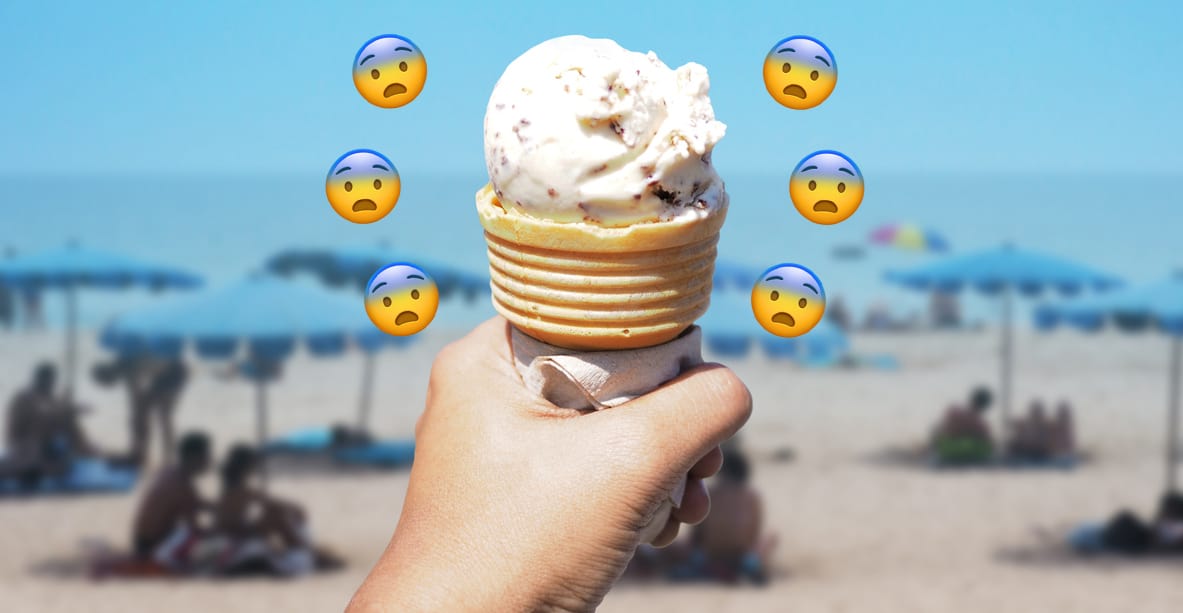Anyone who has hit up their local ice cream parlor during the height of summer knows the pain of a brain freeze. It comes on without warning, causes a throbbing headache, and sometimes, numbness of the mouth and chest. But the worst part about getting a brain freeze is having to stop eating your ice cream or sipping your slurpee in order to cure it. What exactly is a brain freeze and what can we do to prevent it?
*anguished noises indicating slushie-induced brainfreeze*
— Chris Manson 阿劉 (@ChrisLauManson) December 21, 2018
Brain freeze! Brain freeze! Ack!
— Jonathan Joestar (@jonajoestar) December 21, 2018
According to a 2013 article from Wake Forest Baptist Medical Center per ScienceDaily, the scientific term for brain freeze is “sphenopalatine ganglioneuralgia,” and yes, those are real words. Dwayne Godwin, Ph.D., explains that brain freeze happens when we rapidly consume a cold food without giving our mouth or brain time to absorb and recognize the coldness.
Dr. Godwin says that the cold temperature at the back of the throat affects the internal carotoid artery, the artery that feeds blood to the brain, and the anterior cerebral artery, where brain tissue begins. Receptors in the brain’s meninges, or outer layer, where the two arteries meet, transmit the feeling of pain as the dilation and contraction of the arteries occur.
“One thing the brain doesn’t like is for things to change, and brain freeze is a mechanism to prevent you from doing that,” Dr. Godwin said.

Stephanie Vertrees, MD, headache specialist, neurologist and clinical assistant professor at the Texas A&M College of Medicine, added via a 2017 article that sphenopalatine ganglioneuralgia (SPG) nerves, located the back of our palate, are responsible for telling our brain when to have a headache.
SPG nerves are not just victims of cold food. They actually signal other types of headaches as well. Dr. Vertrees explained, “This is the same ganglion that is responsible for migraine headaches and cluster headaches. There has been a lot of research done on this bundle of nerves, but mostly for trying to prevent these more serious and longer-lasting headaches.”

There’s an obvious way to avoid brain freeze — don’t eat cold foods so quickly. Let your mouth warm the food before moving it toward the back of your palate to lower your risk for the freeze. However, if you get a little too excited and a brain freeze hits, press your tongue to the roof of your mouth in order to warm your palate back up.
[video_quote title=”” poster=”” pvideo=”4euixdJ4″ video=”4euixdJ4″ text=””]
So I was at Steak n’ Shake, right. Double fisting a shake and ice water when a brain freeze hits me like a truck. I instinctively put my thumb on the roof of my mouth, no more brain freeze. I’m thinking “how did I know to do that??” Then I remember. Thank you @BrendaSong
— Dave (@mynameisleche) December 21, 2018
Both doctors note that brain freeze isn’t dangerous, it’s just annoying. Take your time, savor your food, and save your brain from the dreaded freeze.

